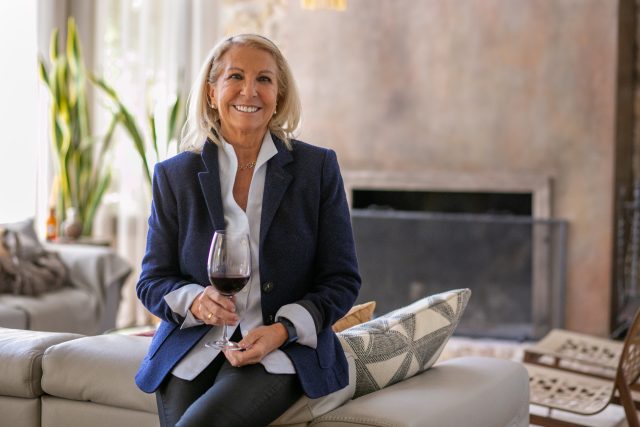Q&A: Susana Balbo
Argentina’s wine industry has been shaped by many leading female figures. In an interview with the drinks business Susana Balbo, who has blazed a trail for women winemakers, reveals how its sustainable practices and charitable endeavours have shown how Argentina is always looking towards the future.

Q: Explain how your role within the Argentinian wine sector has developed over time.
A: I think one of my greatest contributions to the Argentinian wine industry has been my vision to adopt new technologies and alter our business model. The changes I made as president of Wines of Argentina were very deep, and it took a lot of courage to go against what most of the partners wanted. However, time and results have proven that these changes were necessary. Besides, I believe I also contributed by putting all my energies as a producer into producing high-end, export-focused wines. We had to be able to compete with the best wines and wineries of the world and so, in order to do that, we set quality as the standard. This, as well as the natural conditions of our country, allowed us to position ourselves among the most recognised producers in the world due to our quality and value.
Q: Argentina has been an incredible example for sustainable premium wine. Explain a little about this and how it has gained that positioning?
A: Argentina is one of the best places to produce sustainable, premium wines because we have a competitive advantage: our climate. We have a semi-desertic climate with very low precipitation levels and this allows us to obtain very healthy grapes, but it has also made us very aware of the importance of taking care of water and other scarce resources. We live in a place with a very fragile balance, and we have to take care of it in a responsible way. Our climate and our levels of awareness result in a very low usage of agrochemicals and other elements that can damage our planet, and that is why we have a much lower carbon footprint than other countries.
Besides, living in a country with such an unstable economy has led us, business people, to embrace sustainable practices with great responsibility, aiming to have successful companies that allow us to ensure the preservation of our people’s source of income. This is very important, as we cannot ignore the importance of our companies’ profitability in order to guarantee the development of our region.
Q: The importance of equality, diversity and also empowering roles in female leadership is something for which Argentinian wine has become known. Give us your view on this evolution and what it means for the industry.
A: In countries with high levels of corruption, women often provide transparency. Many UN studies have proven that women are much less corrupt than men. I am not saying that there are no corrupt businesswomen: there are, but there are far fewer of them. Another role of women is to provide companies with a much more holistic and comprehensive view of the market: it has also been proven that companies that have women on their boards are more profitable than companies that do not. In addition, in those companies there is a better working environment and more tolerance and diversity.
Regarding my contribution, I personally graduated at a time when men dominated the wine industry. Back then, the presence of women was only considered for analytical or microbiological duties: we were not supposed to work in the winery or vineyard. Today, the situation is very different because we, as women, have earned a great reputation for being creative, responsible, hard-working and excellent professionals. I am proud to say that I paved the way for many female winemakers who came after me, proving that it is possible to have both successful professional and family lives at the same time.
Partner Content
Q: Susana Balbo Wines has played a vital role in assisting in the reputation of Argentinian wine, locally, nationally and globally. Tell us more about how this has played out.
A: I think that my winery and my brands have contributed and still contribute to the reputation of Argentinian wine, because all the awards and recognitions I have received throughout my career have positioned my wines as an example of quality and consistency.
This is important and respected all around the world, of course, and it is a big deal for the local market as well. Argentinians tend to choose producers with great international reputation as their favourites, and their wines are the ones they buy. This has allowed us to sell our products on a great rhythm in the country over the last few years, even though in the past we were completely focused on exports and did not sell in Argentina.
Q: Tell us more about the October Pink Global activations to fight breast cancer and why such activations are important.
A: As a winery founded and led by a woman, we support Pink October and work to raise awareness about the importance of early detection in order to treat breast cancer. This time, we will work with many non-profit organisations from Argentina, Brazil and the USA and make donations for each bottle sold of our 2022 Crios Rosé of Malbec.
The money raised in Argentina, for instance, will contribute to the creation of a cold cap bank that will be administered by Fundavita, a non-profit organisation that works in prevention, research and companionship of cancer patients since 1995. The use of these caps for scalp cooling helps reduce hair loss during the chemotherapy process, and it has been proven that the possibility for patients to keep their usual appearance helps them to maintain their self-esteem and improves their health. We are proud to do our bit in order to support women-related topics. It is a commitment we have assumed and, since half of the members of our winery are women, it is very relevant for us and our community.
Related news
The Castel Group rocked by Succession-style family rift




